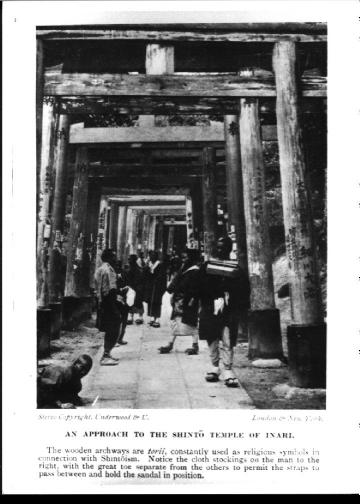稲荷神社への入口.通路上の木製のアーチは鳥居であり,神道と関連する宗教的シンボルとして常に用いられる.右の男の布の靴下(足袋)に注意,それは紐(鼻緒)が間を通ってサンダル(下駄)を正しい位置に保つことができるように親指が他の指と分かれている/(An approach to the Shinto temple of Inari. The wooden archways are torii, constantly used as religious symbols in connection with Shintoism. Notice the cloth stockings on the man to the right, with the great toe separate from the others to permit the ...)
| 被写体 |
: |
稲荷神社への入口.通路上の木製のアーチは鳥居であり,神道と関連する宗教的シンボルとして常に用いられる.右の男の布の靴下(足袋)に注意,それは紐(鼻緒)が間を通ってサンダル(下駄)を正しい位置に保つことができるように親指が他の指と分かれている/(An approach to the Shinto temple of Inari. The wooden archways are torii, constantly used as religious symbols in connection with Shintoism. Notice the cloth stockings on the man to the right, with the great toe separate from the others to permit the ...) |
| 注記 |
: |
|
| 掲載書名 |
: |
日本の物と風景 |
| 編集者名 |
: |
ホランド(ホラント/ホーランド)/(Holland, Clive, 1866-1959) |
| 年代 |
: |
1908 |
| 請求番号 |
: |
DS/809/Ho |
| 図書ID |
: |
000064493 |
| GID |
: |
GD070044 |
| PhotoCD no. |
: |
|
